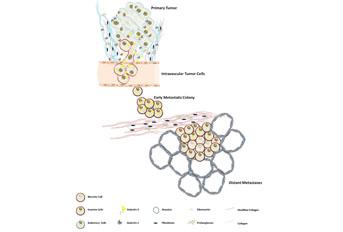Associação Portuguesa de Investigação em Cancro
Hypoxia Up-Regulates Galectin-3 in Mammary Tumor Progression and Metastasis
Hypoxia Up-Regulates Galectin-3 in Mammary Tumor Progression and Metastasis

Um grupo de investigadores do Instituto de Patologia e Imunologia Molecular da Universidade do Porto (IPATIMUP) e do Instituto de Investigação e Inovação em Saúde da mesma Universidade, empreendeu um estudo sobre o efeito do hipóxia na regulação de galectina-3 em tumores mamários caninos, estruturado por Joana Tavares de Oliveira. Com o objetivo de avaliar a regulação da galectina nestes tumores, foram utilizadas linhas celulares de cadelas, em contexto in vitro e in vivo. O grupo descobriu que a hipóxia, leva a um aumento de não só de expressão como também a alteração da localização subcelular da galectina-3 em tumores mamários caninos. A necrose, resultante de zonas hipóxicas tem vindo a ser classicamente associada um pior prognóstico, este estudo sugere que o efeito de privação de oxigénio na sobreexpressão de galectina-3 numa determinada subpopulação tumoral poderá estar envolvido no processo de invasão, bem como no estabelecimento de metástases à distância. Esta descoberta poderá abrir novas considerações no âmbito terapêutico no contexto de doença oncológica da mama.
Autores e afiliações:
Joana T. de Oliveira1,2,3,4, Cláudia Ribeiro1,2, Rita Barros1,2 Catarina Gomes1,2, Augusto J. de Matos3,5, Celso A. Reis1,2,3, Gerard Rutteman6, Fátima Gärtner1,2,3
1 Instituto de Investigação e Inovação em Saúde, Universidade do Porto, Porto, Portugal,
2 Institute of Molecular Pathology and Immunology (IPATIMUP), University of Porto, Porto, Portugal,
3 Instituto de Ciências Biomédicas de Abel Salazar (ICBAS), University of Porto, Porto, Portugal,
4 Faculty of Veterinary Medicine, Lusophone University of Humanities and Technologies, Lisbon, Portugal,
5 Animal Science and Study Central (CECA), Food and Agrarian Sciences and Technologies Institute (ICETA), Porto, Portugal,
6 The Netherlands, Specialist Veterinary Centre De Wagenrenk, Utrecht, The Netherlands.
Abstract:
The tumor microenvironment encompasses several stressful conditions for cancer cells such as hypoxia, oxidative stress and pH alterations. Galectin-3, a well-studied member of the beta-galactoside-binding animal family of lectins has been implicated in multiple steps of metastasis as cell-cell and cell-ECM adhesion, promotion of angiogenesis, cell proliferation and resistance to apoptosis. However, both its aberrantly up- and down-regulated expression was observed in several types of cancer. Thus, the mechanisms that regulate galectin-3 expression in neoplastic settings are not clear. In order to demonstrate the putative role of hypoxia in regulating galectin-3 expression in canine mammary tumors (CMT), in vitro and in vivo studies were performed. In malignant CMT cells, hypoxia was observed to induce expression of galectin-3, a phenomenon that was almost completely prevented by catalase treatment of CMT-U27 cells. Increased galectin-3 expression was confirmed at the mRNA level. Under hypoxic conditions the expression of galectin-3 shifts from a predominant nuclear location to cytoplasmic and membrane expressions. In in vivo studies, galectin-3 was overexpressed in hypoxic areas of primary tumors and well-established metastases. Tumor hypoxia thus up-regulates the expression of galectin-3, which may in turn increase tumor aggressiveness.
Revista: Plos One
Link: http://journals.plos.org/plosone/article?id=10.1371/journal.pone.0134458




